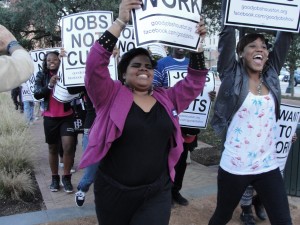Response to Sam Webb’s paper on “A party of socialism for the 21st century…â€
Is the CPUSA a Communist Party in name only?
By the Houston Communist Party
The Houston Communist Party met on 2/6/11 for its monthly meeting. Naturally one of the most important points of discussion was Sam Webb’s new vision of the party as presented in his recent article “A party of socialism in the 21st century: What it looks like, what it says, and what it does.†Most found the document confusing and contradictory. Confusion and contradiction are the classic tools used by the right wing to discredit Communists and the working class.
Many important points were made by club members. One of the first questions that came up was “Do xenophobia, nihilism, anti-communism and blatant self-destruction have any place in the program of the CPUSA?†These are fairly serious charges and should be examined one by one.
Since this revisionist document is the opinion of an individual party member and is not the party program, we will post a critical analysis of this article.
Xenophobia
Certainly Webb is correct that there is more opposition to anything “foreign†from the nutty nuts on the right. Does this mean that the party should capitulate to this way of thinking and formally jettison anything that might be taken as “foreign†from our ideology? He maintains that “Leninism†might be seen as “foreign†and should be removed from our ideological positions. From this logic, also Marxism, socialism, a revolutionary party and class struggle might be seen as “foreign†concepts and should be expunged as well. What does this line of thinking mean for internationalism, support for immigrant’s rights struggles as well as world peace? Back in the 60’s, the John Birch Society used to put up billboards along the highways demanding “Get U.S. out of the U.N.†Should the party embrace this thinking since the right wing view it as “pure†and not “foreign�
One has to wonder what would have become of the great U.S. civil rights struggle led by Dr. Martin Luther King, Jr. if he had decided to abandon Mahatma Gandi, since he was “foreign� What if the leaders of the Haymarket uprising had been run off since they were German socialists and anarchists and were therefore “foreign� What if Fidel Castro had sidelined Che Guevara since he was “foreign� What if organized labor in this country silenced Joe Hill since he was “foreign� By the way, Marx and Engels are just as “foreign†as Lenin and are equally detested by the wealthy elite.
If Leninism is seen as “foreignâ€, then that is a major failure of the party to educate people about what Leninism means.
Dropping Leninism from the party in any kind of formal way is not only dishonest, and self destructive but is “foreign†to the thinking of most party members.
Nihilism
The nasty stench of nihilism can also be detected in Webb’s long discourse which he, himself, describes by stating “Readers will surely note inconsistencies, contradictions, silences and unfinished ideas.†The scary part is that top CPUSA leadership seems to have finished their ideas on the party and intends to finish the party. Webb damns our party ideology (the same ideology on which a great history of working class struggle has been built) as “too rigid and formulaic, our analysis too loaded with questionable assumptions, our methodology too undialectical, our structure too centralized, and our policies drifting from political realities.†These are serious charges and Webb fails to back up his thinking with any facts. It appears that Webb is advocating nihilistic idealism and rejecting materialism. Adolf Hitler, Glenn Beck and Bill O’Reilly could not have slammed the party more effectively.
Webb’s nihilism does not stop here. He predicts war, climate disaster and all manner of apocalyptic catastrophes which could prevent any forward movement of the working class. He certainly does not provide any answers as to how working people can fight back against these overwhelming forces. He opines “After all, there is no direct or inevitable path to socialism. Nor is the working class going to simply ‘rise up’ at some appointed time and fight for a society of justice.†With a CPUSA cowering in the corner, where can the working class seek leadership and guidance?
From this line of thinking should our new slogans be “Workers of the world, come to your senses! Your chains are better than starvation!â€? and/or “What do we want? Nothing! When do we want it? Whenever!â€
Anti-Communism
Again, it is appalling that the ugly face of anti-communism appears at our top leadership. One Houston member pointed out “If it looks like a duck, swims like a duck, and quacks like a duck, it probably is a duck.†Webb is using the ideological weapons of right wing opportunism and liquidationism to mount an anti-communist assault on the party of the working class.
We have theory as a guide to action based on scientific socialist principles discovered by Marx, Engels and Lenin as well as others. The uniqueness of our party is that our theory (Marxism Leninism) is interconnected, interdependent and coherent as well as flexible and fluid to meet the challenges of an ever-changing world. We have a method of analysis (dialectical materialism), practice (historical materialism) and organizational principles (democratic centralism – democracy and unity of action). Without theory, we have no vision that is based on sound foundations, leaving us to flop around aimlessly. Without a path forward based on material conditions, we grow frustrated and ineffective. Without organizational cohesiveness, our force is greatly diminished, easily split and made to work at counter purposes. What Webb proposes is to discard those elements which make us a revolutionary party.
While most of the article was an attack against an imaginary left sectarianism, the most effective disruption of the CPUSA program has been from the right. This is easily demonstrated in our history – Jay Lovestone, Earl Browder, Committees of Correspondence, etc. Have we forgotten Mikhail Gorbachev and Alexander Yakovlev? How did their “new ideas†work out for them? Gorbachev and Yakovlev are some of the most despised people in the former Soviet Union. It is often said that those that do not learn from history are bound to repeat it. Have we learned nothing from the experience in the former Soviet Union where opportunists in the party gutted the CPSU until there was nothing much left to defend?
Liquidationism is the elimination of the party of the working class as an independent force, gutting its theory and purpose and blurring the lines of fundamental class conflict.
Webb has propelled the CPUSA onto the slippery slope of right wing opportunism, reformism, economism and finally liquidation of the party
Self Destruction
Continuing along the road chosen by Webb will only lead to the self destruction of the party. We are reminded of the boiling frog analogy. If a frog is placed in boiling water, it will jump out and save itself. This is what happened when Earl Browder proposed dismantling the party. Webb is being much more subtle and potentially much more effective in destroying the party. If you place a frog in cold water that is slowly heated, it will not perceive the danger and will be cooked to death.â€
The future of the party and the working class
Obviously, anti-communism, xenophobia, and nihilism are poison to a working class party of action. It is up to the members, friends and allies as well as local clubs and district organizers to recognize the self-destructive path we are on and take concrete steps to get us back on course. Obviously, the tactics and strategies we use to fight the class struggle cannot be identical to those strategies and tactics used by Lenin, and Stalin. But to renounce them because the right wing might find them distasteful is unforgiveable. We must not throw out the baby and keep the bathwater. It is up to us to educate working people about our history and what our theory has to offer them in their everyday struggles against the real enemy, capitalism. If we renounce Stalin completely, then we are saying that his contributions to the defeat of German fascism and Japanese imperialism were wrong and we are renouncing the fact that he was a powerful ally of the U.S. in those global struggles.
Since the left and organized labor are in disarray, our party needs to seize the moment and reclaim our role as the vanguard party of the working class. No one is going to award it to us just because we’re good looking. We are going to have to earn it through struggle and victories for the working class.
We, the Houston Communist Party, call on all Communists to demand an extraordinary National Convention to decide the future of the party. We are calling for a people’s trial of the Webb faction for its blatant and open betrayal of our Party Program and Constitution, mismanagement of party resources, disassembling of the party organizational structure as well as advocating right wing opportunism and efforts to liquidate the party. Such a trial should be easy to carry out since Webb and his small group of cronies have been very public about their treachery against the CPUSA. If found guilty of crimes against the working class and the Communist Movement, they should be unceremoniously removed from office and the control of party resources should be wrenched out of their grasp. It is time to close this humiliating chapter of CPUSA history and move forward with a fully rejuvenated party.













